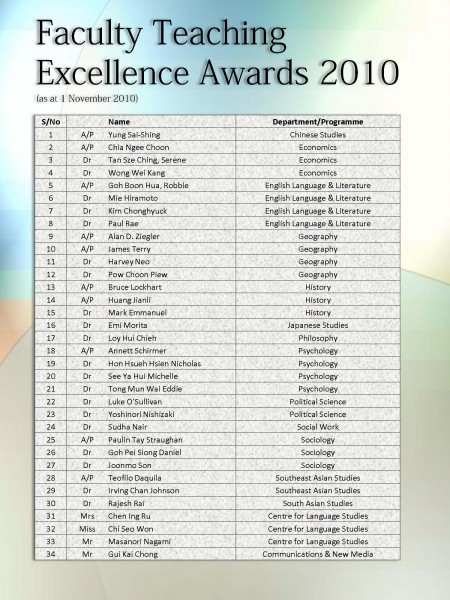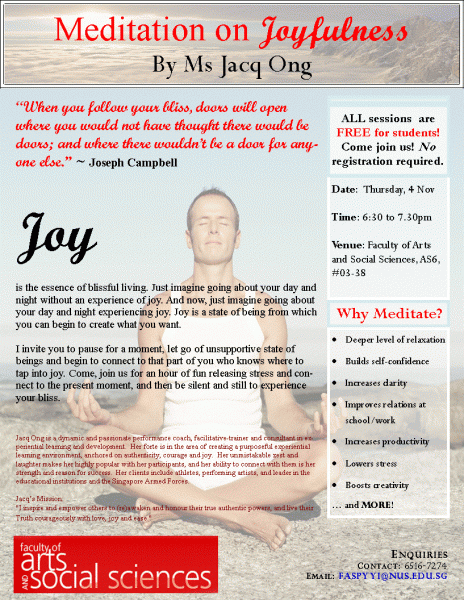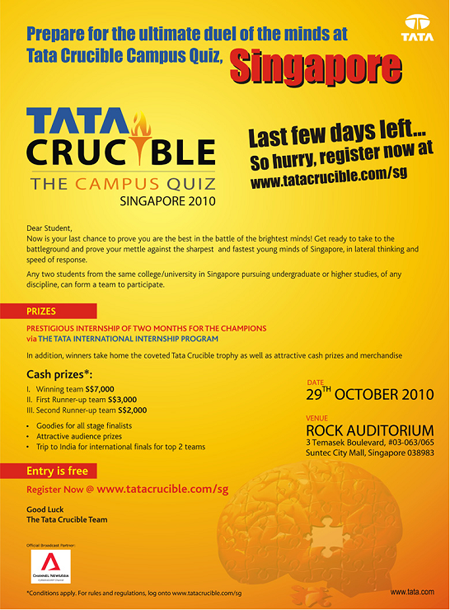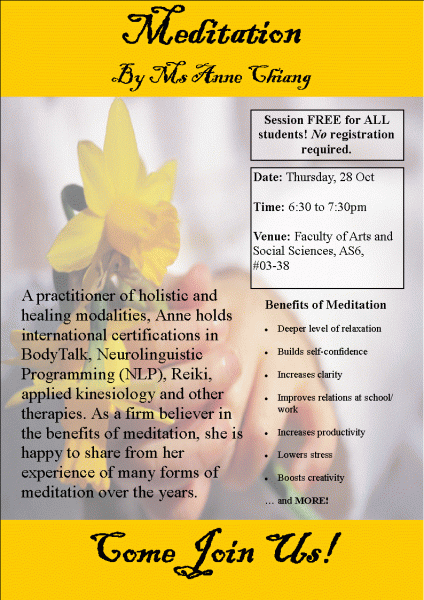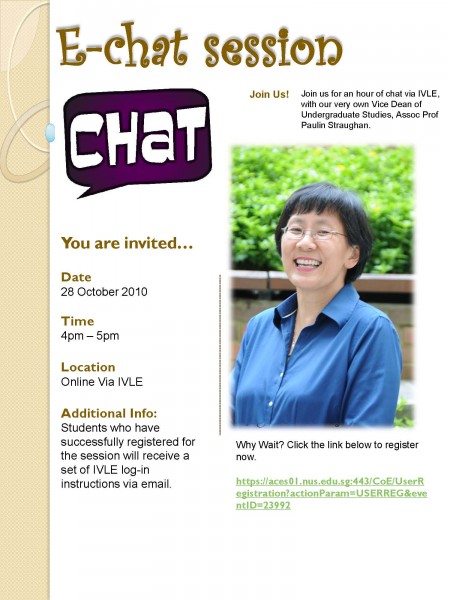Read more on
– Finding Peace: The Meditation Series, A/P Millie Rivera, 7 Feb 2010
Year: 2010
Claris Zhao wins Singapore Psychological Society Undergraduate Research Award
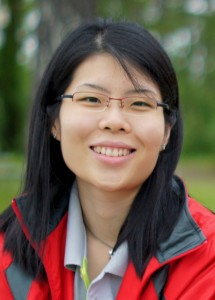
The Singapore Psychological Society organizes an annual Undergraduate Research Award (URA) Symposium, with the goal of encouraging research and scientific inquiry in undergraduate education in psychology. Awards are presented to an undergraduate student from each of the respective institutions whose Honours thesis is the best in their cohort. The awardee this year from NUS is Ms. Claris Zhao. This year, the Symposium will be held at NUS, LT 12, Faculty of Arts and Social Sciences, on 30 October 2010.
Claris, who is currently a graduate student with the Psychology department, has given a short summary of what she will be presenting at the symposium:
The looming cognitive style (LCS) describes a durable pattern of cognition associated with the tendency to generate dynamic scenarios of potential threats as escalating in risk or progressing towards a dreaded outcome. The present research examined whether the LCS is associated with a chronic salience of threat- and motion-related mental representations as well as biases in perceptions of probability and cost towards hypothetical future events. State anxiety as a possible moderator of the relations between the LCS and these biases was also investigated. The importance of addressing such biases in the framework of the looming vulnerability model is discussed.
Congratualtions Claris!
NUS hosts inaugural CSDA-PAVe Symposium on family violence
By Student Blogger Ian Goh
 The Centre for Social Development Asia (CSDA, NUS) and the Centre for Promoting Alternatives to Violence (PAVe) held their inaugural joint-symposium last Thursday, on the 21st of October, entitled “Emerging Trends of Family Violence in Singapore: Reflecting, Connecting, Paving New Frontiers”.
The Centre for Social Development Asia (CSDA, NUS) and the Centre for Promoting Alternatives to Violence (PAVe) held their inaugural joint-symposium last Thursday, on the 21st of October, entitled “Emerging Trends of Family Violence in Singapore: Reflecting, Connecting, Paving New Frontiers”.
Over 200 guests and dignitaries from the Singapore Police Force, the Ministry of Community Development, various hospitals, community hubs and volunteer organisations gathered at the NUS Shaw Foundation Alumni House to discuss the prevalence of domestic family violence—a rising issue within the local community.
Among those in attendance was Guest of Honour, Dr Maliki Osman, Parliamentary Secretary of the Ministry of National Development, and also Honorary Advisor to PAVe’s Managing Committee.
“[This symposium] provides a platform for professionals in health-care, social, and government services, to share, consolidate, and learn from one other’s experiences in managing and preventing family violence,” he said in his opening address.
PAVe, a joint-organiser of the Symposium, reflected on a decade of their history and operations, which include preventive and developmental programmes to discourage violence at home, together with public education of both parents and their children, in dealing with these issues.
In a 2002 World Health Organization (WHO) report, over 199,000 youths were killed in cases of interpersonal disputes. In Singapore, the incidents of child abuse (aged 0-4 years old) have also steadily increased in the years 2006 to 2009, as shared by Dr Angelina Chan, Senior Consultant Psychiatrist at Changi General Hospital, and one of three speakers who presented their findings at the symposium.
Paper topics also included “Breaking Barriers: Understanding Immigrants Affected by Domestic Violence in Singapore”, as well as a paper presentation by our Faculty’s own Dr Sudha Nair, Deputy Head of the Department of Social Work in NUS, whose paper titled “Bridging Troubled Waters: The Case for Community Cooperation”, spoke on the need for greater coordination and communication between members of the community of care-givers.
“CSDA’s mandate is to work with the community. The involvement with PAVe was our first with a voluntary welfare organisation. And yes, we do hope to develop more links and projects together,” she shared, on the Department’s long history with community organisations like PAVe.
Finally, members of the audience then signed up for one of three Break-Out Groups—or discussion groups, where they shared about their experiences in the industry, some of the challenges they faced, and how the lessons from the Symposium that day benefited their line of work.
Furthermore, over 15 NUS students from the Department of Social Work and other faculties had the opportunity to rub shoulders with these health-care professionals, while engaging in discussion on the rising trend of domestic violence in Singapore.
Says Deborah Yap, an undergraduate minor-ing in Social Work, “I think it’s very important that this issue be made known to the public—perhaps it can be prevented in that way.”
When asked on her thoughts on the Symposium, she reflected, “It raises awareness of what was taught in our various classes, and it really inspires us to see all these professionals already passionately working in the field. Overall it was a meaningful event, and I’m glad I came down.”
e-Chat via IVLE with A/P Paulin Straughan – 28 Oct 2010
You are invited to join in for an e-chat session with our very own Vice Dean of Undergraduate Studies, Assoc Prof Paulin Straughan on Thursday, 28 October 2010, from 4pm to 5pm.
To register, click here or the URL below.
https://aces01.nus.edu.sg:443/CoE/UserRegistration?actionParam=USERREG&eventID=23992
Students who have successfully registered will be receiving a set of log-in instructions via email.
Prof Barry Eichengreen delivers thought-provoking Public Lecture
On October 19th, Prof Barry Eichengreen, George C. Pardee and Helen N. Pardee Professor of Economics and Political Science, University of California, Berkeley delivered his second public lecture as the Monetary Authority of Singapore (MAS) Term Professor in Economics and Finance at the Department of Economics, NUS.
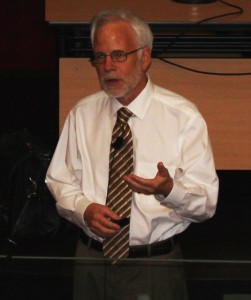
Prof Eichengreen made some late changes to his talk, changing the title to “The Long-term consequences of the Financial Crisis: What we know, what we don’t, and what we can learn from the 1930s.”
This new title reflected what Prof Eichengreen believes is the need for economists to adopt a more singular approach to the crisis given how the recent crisis has been so deep, global and financially-pervasive. Economists have been quick to judge the causes and short-term consequences of the crisis but analysis of potential long-term consequences has been scant, resulting in a high degree of uncertainty as to whether or not future growth will be permanently imparied by the crisis. The lecture was followed by a vibrant and wide-ranging Q&A session.
China, India and You! @ Central Forum (26 October 2010)
You’re invited to the student celebrations event – “China, India & You!” at the Central Forum on 26 October 2010 (Tuesday) 11am.
This event is organized by the NUS International Relations Office (IRO), with support from the Office of the Vice-President (University and Global Relations), NUS, and a group of student leaders who are keen to showcase everything (almost) about China & India to the NUS Community.
To view more, click here.

